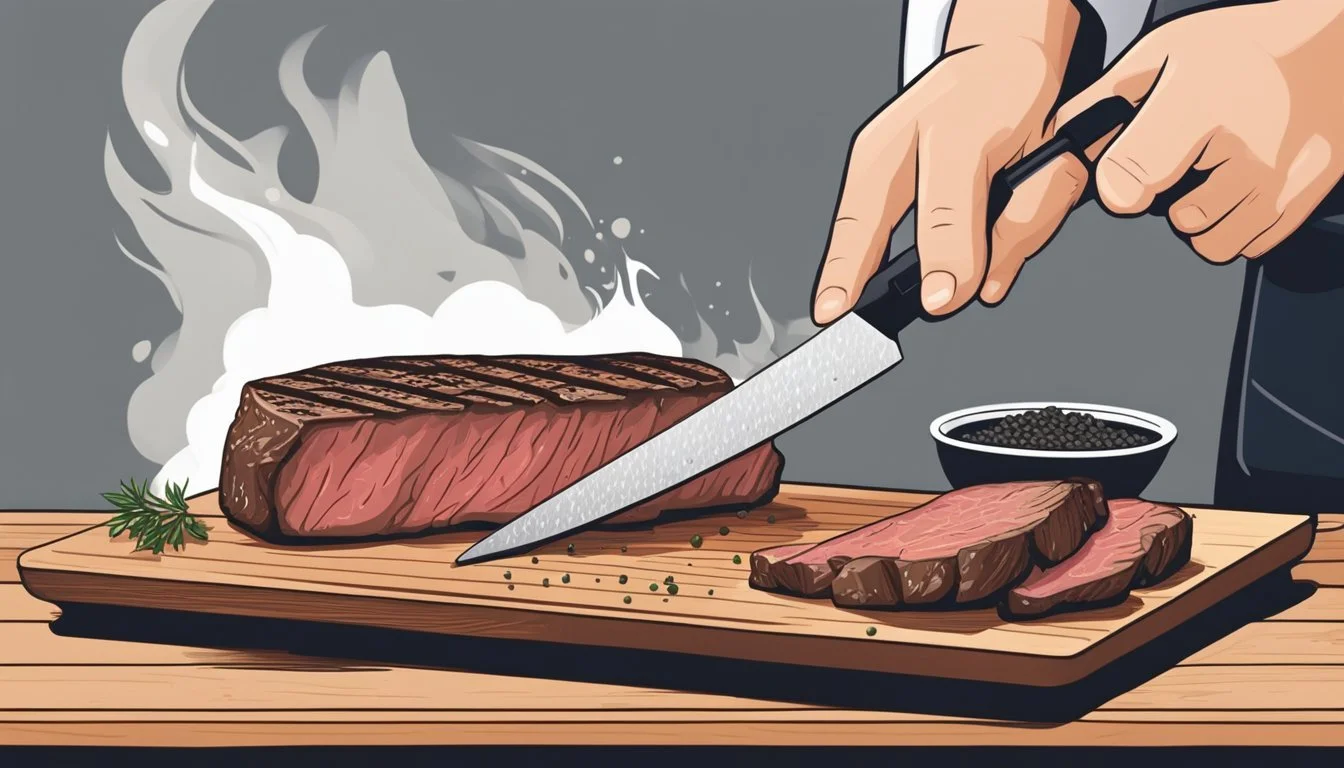Reddit's Juicy Verdict: Unveiling the Best Grocery Stores for Mouthwatering Steaks
Finding high-quality steak at a reasonable price can be a challenge for many grocery shoppers. Online discussions often point to certain supermarket chains as reliable sources for premium cuts. Dedicated meat lovers recommend stores like Wegmans, Costco, and some regional chains for consistently good beef selections at competitive prices.
Grocery stores with well-managed meat departments tend to offer better quality steaks. Some Reddit users praise Wegmans for their choice and prime ribeyes, noting excellent marbling that rivals more expensive options. Costco also receives frequent mentions for carrying choice-grade beef at lower prices than many competitors, especially when other stores aren't running sales.
While opinions vary, many shoppers find success by developing relationships with butchers at their local supermarkets. This approach allows customers to learn about sourcing practices and get insider tips on the best cuts available. Regular grocery shopping trips can become opportunities to scout out exceptional steaks and take advantage of periodic markdowns on premium selections.
Understanding Steak Quality
Steak quality is determined by several key factors that impact taste, texture, and overall eating experience. These include official beef grades, marbling levels, and various certifications.
Grades of Beef
The USDA grades beef based on marbling and maturity. Prime is the highest grade, featuring abundant marbling. Choice is the next tier, with moderate marbling. Select has slight marbling and is leaner.
Prime steaks offer superior tenderness and flavor. They're often found at high-end restaurants and specialty butchers. Choice cuts provide good quality at a more accessible price point. Many grocery stores carry Choice grade beef.
Select grade is leaner but may lack the juiciness of higher grades. It's suitable for those preferring less fat content.
Marbling and Flavor
Marbling refers to the intramuscular fat that appears as white flecks within the meat. Higher marbling correlates with improved flavor and juiciness. This fat melts during cooking, enhancing taste and tenderness.
Well-marbled steaks tend to be more forgiving when cooked. They maintain moisture better, even if slightly overcooked. Leaner cuts require more precise cooking to avoid dryness.
The amount of marbling also influences the steak's flavor profile. More marbling typically results in a richer, more robust beef taste.
Labels and Certifications
Various labels and certifications provide additional information about steak quality and production methods. Certified Angus Beef must meet specific quality standards beyond USDA grades.
Organic certification indicates the cattle were raised without synthetic pesticides or fertilizers. It also prohibits the use of growth hormones and antibiotics.
Grass-fed labels signify cattle raised primarily on pasture. This can affect flavor and fat composition. Animal welfare certifications like Humane Certified address ethical concerns in beef production.
These labels can help consumers make informed choices based on their preferences for taste, health, or ethical considerations.
Best Grocery Stores for Steak
Finding high-quality steaks requires knowing which grocery stores prioritize their meat departments. Several major chains and specialty markets stand out for their steak selections, sourcing practices, and customer service.
Whole Foods Market Selection
Whole Foods Market offers a premium steak selection. They focus on organic and grass-fed beef options. The meat counters feature skilled butchers who can provide custom cuts.
Whole Foods' stringent animal welfare standards set them apart. They use a 5-step animal welfare rating system for all meat. This ensures transparency in sourcing practices.
Their steaks tend to be pricier than conventional supermarkets. However, many customers feel the quality justifies the cost. The store frequently runs sales on select cuts, making premium steaks more accessible.
Costco's Bulk Offerings
Costco is known for its competitive pricing on bulk meat purchases. Their meat department offers both Choice and Prime grade beef. This allows customers to access restaurant-quality cuts at wholesale prices.
The warehouse store's steak selection includes popular cuts like ribeye, New York strip, and filet mignon. They often sell these in multi-packs, ideal for large families or events.
Costco's Kirkland Signature brand also offers organic grass-fed beef options. These provide a more budget-friendly alternative to specialty stores for health-conscious consumers.
Kroger and Affiliates
Kroger, along with its affiliate stores like Ralph's and Fred Meyer, provides a wide range of steak options. They carry both Choice and Select grades, catering to different price points.
These stores frequently run sales on steaks, especially during grilling season. This makes them a popular choice for budget-conscious shoppers seeking quality meat.
Kroger has also expanded its natural and organic beef offerings in recent years. This includes grass-fed and antibiotic-free options, meeting growing consumer demand for these products.
Trader Joe's Unique Finds
Trader Joe's offers a curated selection of steaks, often at competitive prices. They focus on providing unique cuts and marinades that set them apart from traditional supermarkets.
The store's steak options include pre-marinated varieties and grass-fed beef. These cater to customers looking for convenience or specific dietary preferences.
Trader Joe's smaller format means their selection may be more limited than larger supermarkets. However, their quality-to-price ratio often makes them a favorite for steak enthusiasts.
Publix's Customer Service
Publix is renowned for its exceptional customer service, which extends to its meat department. Their butchers are known for their willingness to provide custom cuts and cooking advice.
The supermarket chain offers a range of USDA Choice beef. They also carry some Prime cuts, though availability may vary by location.
Publix frequently runs BOGOs (Buy One Get One) deals on steaks. This makes it easier for customers to stock up on quality cuts at more affordable prices.
Wegmans' Quality Meats
Wegmans has built a reputation for high-quality meats, including an impressive steak selection. They offer a variety of grades, from Choice to Prime, catering to different preferences and budgets.
The store's meat department is staffed by knowledgeable butchers. These experts can provide custom cuts and cooking recommendations to customers.
Wegmans also emphasizes transparency in their meat sourcing. They provide detailed information about their beef suppliers and animal welfare standards.
Specialty Choices at Sprouts
Sprouts Farmers Market focuses on natural and organic options, including their steak selection. They offer grass-fed and grass-finished beef, appealing to health-conscious consumers.
The store's butchers can provide custom cuts and offer cooking tips. This personalized service enhances the shopping experience for steak buyers.
Sprouts often runs sales on their meat products. This makes their specialty steak options more accessible to a wider range of customers.
Local Butcher Shops
While not a chain, local butcher shops often provide superior steak quality and service. These shops typically source from local farms and offer expert knowledge about cuts and preparation.
Many butcher shops provide specialty cuts not found in supermarkets. They may also dry-age steaks in-house, a process that enhances flavor and tenderness.
The personalized service at butcher shops often includes detailed sourcing information and cooking advice. This makes them a valuable resource for steak enthusiasts seeking top-quality meat.
Evaluating Cost and Value
Grocery store steak prices can vary widely based on quality, cut, and retailer. Savvy shoppers balance cost with desired attributes to find the best value.
Premium vs. Budget-Friendly Options
Prime grade steaks command higher prices but offer superior marbling and tenderness. Whole Foods Market and specialty butchers typically stock prime cuts, though availability may be limited. For everyday enjoyment, choice grade steaks provide good quality at more affordable prices. Many shoppers find satisfactory options in the $5-$25 per pound range at mainstream grocers.
Budget-conscious consumers can look to less expensive cuts like sirloin or flank steak. These leaner options benefit from proper preparation and cooking techniques. Some shoppers opt for frozen steaks to save money without sacrificing quality.
Understanding Price Factors
Several factors influence steak pricing:
Grade (Prime, Choice, Select)
Cut (ribeye, filet, NY strip, etc.)
Aging process
Sourcing and origin
Animal welfare practices
Grass-fed and organic beef often cost more due to production methods. Some consumers feel the potential health benefits and ethical considerations justify the higher price. Specialty breeds like Wagyu fetch premium prices for their intense marbling and flavor.
Finding Grocery Store Deals
Savvy shoppers can find great steak deals through:
Weekly sales circulars
Loyalty programs
Bulk purchases at warehouse clubs like Costco
Markdown sections for soon-to-expire meats
Seasonal promotions (e.g. grilling season specials)
Some stores offer better everyday prices on certain cuts. Walmart often has competitive pricing on select steaks. Local butcher counters may provide personalized service and occasional specials. Comparing prices across multiple retailers helps identify the best values for desired cuts and quality levels.
Steak Selection and Variety
Grocery stores offer a range of steak options to suit different preferences and budgets. The selection typically includes popular cuts, specialty items, and various quality grades.
Range of Cuts Available
Most grocery stores stock common steak cuts like ribeye, sirloin, and New York strip. Choice-grade ribeyes are often available at competitive prices, sometimes as low as $10-14 per pound. T-bone and porterhouse steaks may also be found, with the distinction based on tenderloin thickness.
Sirloin is popular for its flavor and affordability. Some stores offer prime cuts for those seeking higher quality. Ground beef is usually available in different lean-to-fat ratios.
Many stores also carry flank steak, skirt steak, and chuck steaks for more budget-friendly options.
Unique Offerings
Some grocery stores differentiate themselves with specialty steak offerings. These may include:
Wagyu beef
Dry-aged steaks
Grass-fed meat options
Organic or hormone-free beef
Whole Foods is known for carrying these premium options. Other stores may have rotating specialty selections or seasonal offerings.
Meat Department Services
On-site butchers can enhance the grocery store steak experience. Services often include:
Custom cuts to desired thickness
Trimming and tying roasts
Advice on cooking methods
Special orders for specific cuts
Some stores offer marinated or seasoned steaks for convenience. Butcher counters may also provide information on steak origins and farming practices.
Stores with robust meat departments tend to have fresher selections and more knowledgeable staff to assist customers in choosing the right steak for their needs.
Preparing Your Steak
Proper preparation is key to unlocking a steak's full flavor potential. The techniques used for cooking and handling the meat can significantly impact its taste and texture.
Cooking Techniques
Reverse searing is a popular method for achieving restaurant-quality results at home. Start by cooking the steak in a low-temperature oven (200-275°F) until it reaches the desired internal temperature. Then, finish with a quick sear in a hot pan or on the grill for a crispy exterior.
For thinner cuts, direct high-heat cooking works well. Heat a cast-iron skillet or grill to high temperature. Sear the steak for 3-5 minutes per side, depending on thickness and desired doneness.
Some chefs recommend basting the steak with butter during cooking to enhance flavor and promote even browning. This technique can add richness and help create a delicious crust.
Meat Handling Tips
Allow the steak to come to room temperature before cooking. This ensures more even cooking throughout the meat. Pat the steak dry with paper towels to remove excess moisture, which can inhibit browning.
Season generously with salt and pepper just before cooking. Some prefer to salt the steak an hour or more in advance to draw out moisture and concentrate flavors.
After cooking, let the steak rest for 5-10 minutes before cutting. This allows juices to redistribute, resulting in a more tender and flavorful bite.
For maximum tenderness, slice against the grain when serving. This cuts through muscle fibers, making each bite easier to chew.
Consumer Insights
Shoppers share varied experiences when buying steaks from grocery stores. Their feedback highlights preferred chains, quality assessments, and pricing considerations.
Reviews and Ratings
Costco receives praise for its steak quality and value. Reddit users note Costco's choice ribeyes are priced competitively at $12.99-$14.99 per pound. Some report finding prime-like marbling in Costco's choice cuts.
Whole Foods earns mentions for offering prime and organic grass-fed options. However, higher prices limit accessibility for some consumers.
Traditional chains like Ralph's, Von's, Albertson's, and Stater Bros. garner mixed reviews. Customers report inconsistent experiences, with some finding excellent deals and others disappointed by quality.
Shopper Experiences
Many Reddit users recommend seeking out sales at major chains for the best value. Some prefer having steaks custom-cut by in-store butchers.
Walmart and Target steaks receive less attention in discussions, suggesting they may not be top choices for steak enthusiasts.
Social media and online forums play a key role in shaping perceptions. Shoppers often share photos and detailed reviews of their grocery store steak purchases.
Store ambiance and customer service also factor into overall experiences. Clean meat departments and knowledgeable staff contribute to positive impressions.
Beyond Beef
Beyond Beef offers plant-based alternatives to traditional meat products. This innovative option caters to various dietary preferences and nutritional needs while providing a sustainable choice for environmentally conscious consumers.
Alternative Meat Options
Beyond Beef products include ground beef substitutes, burger patties, and steak slices. These plant-based options closely mimic the taste and texture of conventional beef. Available at major grocery stores like Walmart and Kroger, Beyond Beef items are typically found in the refrigerated or frozen sections.
The company's newest product, Beyond Steak, is now sold in 5,000 stores nationwide. Priced at $7.99 for a 10-ounce package, it offers a convenient option for those seeking meat-free alternatives.
Complementary Food Items
Beyond Beef products can be incorporated into various dishes, similar to traditional meat. They pair well with rice, cheese, and vegetables for creating balanced meals. These plant-based options are versatile enough to use in tacos, burritos, and deli sandwiches.
For a complete meal, consider adding fresh produce, whole grains, and plant-based dairy alternatives. Many grocery stores now offer dedicated sections for plant-based products, making it easier to find complementary items for Beyond Beef dishes.
Sustainability and Ethical Practices
Grocery stores are increasingly focusing on sustainability and ethical practices in their meat departments. This shift reflects growing consumer demand for responsibly sourced products that prioritize animal welfare and environmental stewardship.
Ethical Sourcing and Animal Welfare
Many grocery chains now offer organic and grass-fed meat options. These products come from animals raised without antibiotics or hormones, often in more natural environments. Grass-fed beef, for example, typically comes from cattle allowed to graze freely on pastures.
Some stores partner with local farms to ensure transparent sourcing. This allows customers to know where their meat comes from and how the animals were treated. Ethical sourcing also extends to fair labor practices in the supply chain.
Stores may display certifications like Animal Welfare Approved or Certified Humane on their meat products. These labels indicate adherence to specific standards of animal care and treatment.
Environmental Considerations
Sustainability in the meat department goes beyond animal welfare. Grocery stores are adopting practices to reduce their environmental impact. Some focus on reducing packaging waste by offering bulk options or using recyclable materials.
Energy-efficient refrigeration systems help lower carbon footprints. Stores may also prioritize local sourcing to reduce transportation emissions. Some chains have committed to selling only sustainably sourced seafood to protect ocean ecosystems.
Offering plant-based alternatives alongside traditional meat products is another way stores address environmental concerns. These options typically have a lower carbon footprint than conventional meat.
Stores may highlight their sustainability efforts through in-store signage or on their websites, helping customers make informed choices.







